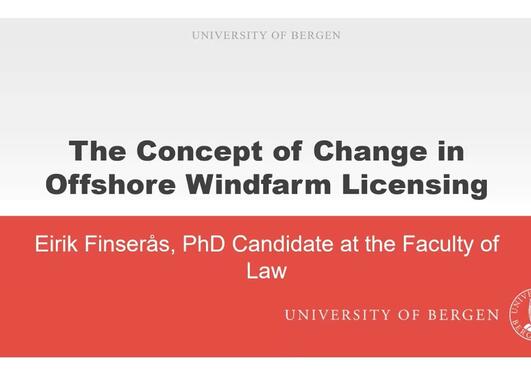Changes over time in renewable energy project and impact assessment
Eirik Finserås, PhD Candidate, Faculty of Law, UiB will give us insight into changes over time in renewable energy project and impact assessment.

Hovedinnhold
The Concept of Change in Offshore Windfarm Licensing
The concept of change invites complex considerations to certain matters in procedural law governing the licensing of large-scale offshore windfarms (OWF). During the time-consuming licensing procedure by which the developer obtains a permit to construct and operate an OWF, we may reasonably assume that the planned development is likely to operate within evolving socioeconomic and environmental parameters. The dynamics of an ecosystem may introduce unforeseen environmental impacts and human dynamics may introduce improved technology which can reduce such impacts and also improve the capacity and efficiency of the turbines. The need for flexibility in licensing procedures is therefore apparent.
How this flexibility has manifested itself in environmental impact assessments is through the widely-used Rochdale approach in the OWF industry, the legality of which was originally tested and affirmed in UK courts. The Rochdale approach permits the developer to assess the likelihood of environmental impacts from worst-case parameters. While this is a necessary and welcomed flexibility mechanism, it nevertheless introduces some significant legal issues which can have a negative bearing on successfully deploying OWF. These issues warrant a discussion on the best-practice of the approach and also how existing regulation in certain North Sea States can contribute towards policing its abuse. Although the EIA Directive only requires minimum implementation and certain details of the procedural obligations therein may differ amongst implementing States, it is currently thought that the Directive adequately regulates the potential abuse of the Rochdale approach.
Webinar speaker
Eirik Finserås, PhD Candidate, Faculty of Law, University of Bergen
